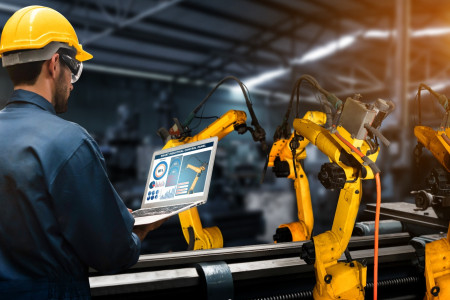Automation for SMEs is critical to the future of UK Manufacturing
Small to medium-sized enterprises (or SMEs) are well known for their innovation. At last count, the UK was home to some 5.82 million SMEs, a large proportion of which had a role to play in the pioneering progression of their respective industry sector. The number of SMEs continues to grow from strength to strength, and with this, the standards for industry-leading innovation are getting higher and higher.
Technology is critical to achieving the innovation for which small to medium-sized businesses are applauded. Because of this, automation in the SME sector is a very attractive and exciting prospect indeed.
Autonomous mobile robots, or AMRs, and SMEs are two terms that should go hand-in-hand. The use of automation for SMEs is growing, with enterprises specialising in manufacturing particularly keen to utilise automation in the SME sector. Yet there are several obstacles that stand in the way of AMRs and SMEs forming the progressive, productive partnership that they should be establishing.
In this blog post, we take a closer look at the use of automation in the SME sector, the burgeoning relationship between AMRs and SMEs, the challenges that SMEs face when introducing automated technologies into their business operations, and the government-funded solutions that could provide the answer.
SMEs must be Supported by Government Funding for Automation
The Covid-19 pandemic made automation the mainstay it should be for many businesses, including SMEs. The use of automation became less of a luxury and more of a necessity for companies looking to make working from home work for them. According to this study, however, SMEs still remained ‘behind the curve’ when implementing automation to enhance their remote working policies.
Research found that just 27% of businesses made use of automation in the SME sector during this period, which made transitioning from their regular, pre-pandemic way of working to a ‘work from anywhere’ scenario particularly difficult. IT, infrastructure and communication problems were just some of the issues these businesses faced without the necessary automation for SMEs in tow.
Unbelievably, despite these challenges, 47% of the small to medium-sized businesses surveyed admitted that they had no plans to access automation in the SME sector to enhance their processes into the future.
These findings don’t come as a shock to autonomous mobile robot specialists like us. Despite our passion for connecting AMRs and SMEs for better business, minimal uptake is the reality across many of the sectors that SMEs reside in, including the manufacturing industry.
The solution? In comparison to other industry-leading countries worldwide, the UK lacks the government support needed to make automation for SMEs a priority and help the organisations at the centre of industry keep up with the rest of the world.
What is Stopping SMEs from Automating?
Government support isn’t the only factor when it comes to the lack of cohesion between AMRs and SMEs in the UK. As many industry experts have observed, SMEs within the manufacturing sector don’t need to work harder to achieve world-leading status, they just have to work smarter.
Many rival manufacturers based outside of the UK have finely tuned processes that put automation for SMEs first. Their robot density correlates directly with productivity levels, with the use of automation in the SME sector resulting in heightened productivity amongst other things. While the UK’s automotive manufacturing sector is no doubt leading the way in automation uptake, the remaining SMEs serving other areas of the manufacturing industry are floundering.
Despite the obvious benefits of automation in the SME sector, small to medium-sized businesses in particular are not taking up automation. The introduction of a new asset like an autonomous mobile robot requires significant investment – which provides a healthy return, both financially and across other areas further down the line, such as productivity and downtime. But with a focus on purchase costs and payback times, instead of the longer-term advantages, SMEs aren’t getting past the starting line.
Questions and issues surrounding the compatibility of AMRs with existing infrastructure has also prevented businesses from taking the leap into automation for SMEs. Attitudes surrounding the use of AMRs have put SMEs on the back foot too. Synonymous with large-scale, multinational operations, AMRs have a reputation for being so expensive and initially disruptive that only businesses of certain sizes can afford to implement them. The reality however is very different.
No business is too small for automation, with AMRs and SMEs of all sizes and niches coming together to solve a long list of challenges in recent years. Automation for SMEs has the power to overhaul any process (including existing practices), increase labour allocation, boost productivity, improve labour retention, reduce costs, minimise downtime, and lower errors for even better business.
We Need to Change the Culture of SMEs
The lack of readiness for automation in the SME sector has now become the subject of government policy.
The government’s Help to Grow: Digital support scheme hopes to alter attitudes towards automation for SMEs, increase uptake within the sector, and increase short- and long-term collaboration between small- to medium-sized businesses and automation companies. With this, it is hoped that the limitations faced in previous years can be overcome and the barrier that separates AMRs and SMEs can finally be lifted to aid automation in the SME sector and boost the wider economy.
By working with approved suppliers, SMEs will have access to the support, advice and automated technology they need to improve their operations and officially level up the playing field on the global manufacturing scene.
The phased scheme will provide support to up to 100,000 SMEs, providing the much-needed link between the business world and the automation companies that can help them unlock better productivity and profitability through the integration and use of automation for SMEs.
With modern technology at the helm of these SMEs, businesses can save time and money as well as access government funding that will cover up to £5,000 or 50% of the purchase cost of such technologies. To qualify, SMEs must have been trading for a minimum of one year and have an existing, UK-based audience. Qualifying businesses would also need to prove that they are fully compliant with cyber security and GDPR policies.
The government’s Help to Grow: Digital scheme is certainly a step in the right direction for automation in the SME sector, with an exciting culture change surrounding automation for SMEs predicted to follow.
Conclusions on SMEs and automation
Despite the tech-savvy nature of our personal lives, the same progression on a professional level isn’t coming easy, and won’t if the collaboration between SMEs, automation companies and the government isn’t forthcoming.
The partnership between AMRs and SMEs has its limitations, much like the wider digitalisation of UK industry. But with support, companies can find the financial help and advice needed to introduce, integrate and utilise automation in the SME sector to enjoy some incredible advantages.
Whilst the government’s Help to Grow: Digital scheme is welcome news for automation companies like us and businesses looking to move their operations into the future right now, there need to be more provisions to help SMEs move forward on their digital journeys. The implementation and integration of automation for SMEs has its obstacles, after all. With the right partner to guide you through, however, these challenges can be transformed into distinct advantages that help to establish an enviable reputation not just here in the UK, but in Europe and much further afield.
Free Autonomous Mobile Robot Trial for SMEs
Here at Guidance Automation, we want to do our bit to make automation for SMEs an everyday reality. We provide a free autonomous mobile robot trial exclusively for SMEs with this in mind.
Our free trial aims to address the issues mentioned above as well as answer the key questions that are holding back the use of automation for SMEs. With our free, no-obligation 3-month trial, small to medium-sized businesses can realise first-hand the benefits that investing in automation can bring to individual companies, and discuss how best to integrate AMRs into existing systems.
We urge all our SME clients to try before they buy to truly understand what automation can do for them, whether they wish to take a flexible or gradual approach to the adoption of automation. We’re making AMRs more accessible and cost-effective than ever so SMEs everywhere can create the efficient and flexible operations that help them thrive, not just survive.
For further information about our free autonomous mobile robot trial for SMEs, please click here. Alternatively, you can contact our team directly to discuss the value of automation in the SME sector. Let’s collaborate to innovate and see what the future has in store for your SME.




